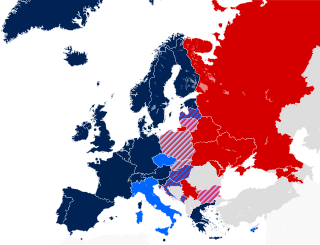Same-sex marriage, also known as gay marriage, is the marriage of two people of the same legal sex. As of 2023, marriage between same-sex couples is legally performed and recognized in 34 countries that have a total population of about 1.35 billion people, with the most recent being Andorra.

Egale Canada is an advocacy organization founded in 1986 by Les McAfee to advance equality for Canadian lesbian, gay, bisexual and transgender (LGBT) people and their families, across Canada.
Positive obligations in human rights law denote a State's obligation to engage in an activity to secure the effective enjoyment of a fundamental right, as opposed to the classical negative obligation to merely abstain from human rights violations.

Lesbian, gay, bisexual, and transgender (LGBT) people in Estonia may face legal challenges not experienced by non-LGBT residents. Both male and female same-sex sexual activity are legal in Estonia. Since 1 January 2016, same-sex couples may register their relationship as a cohabitation agreement, which gives them almost all the same legal protections available to opposite-sex couples. Nevertheless, same-sex couples are unable to marry or jointly adopt.
Latvia does not recognize same-sex marriage but same-sex couples are able to register their partnerships with the courts. On 12 November 2020, the Constitutional Court of Latvia ruled that the Latvian Constitution entitles same-sex couples to receive the benefits and protections afforded by Latvian law to married opposite-sex couples, and gave the Saeima until 1 June 2022 to enact a law protecting same-sex couples. In December 2021, the Supreme Court ruled that should the Saeima fail to pass civil union legislation before the 1 June deadline, same-sex couples may apply with a court to have their relationship recognized and enjoy similar rights and benefits to married couples. The Saeima failed to approve such legislation by the deadline, and the first same-sex union was recognized by the Administrative District Court on 30 May.
Lithuania does not recognise same-sex marriages or civil unions. A bill to grant same-sex couples some limited legal rights and benefits is pending in the Seimas.
Estonia has recognised same-sex registered partnerships since January 1, 2016. These unions provide same-sex couples with some of the rights, benefits and obligations of marriage. Estonia's current government has vowed to legalize same-sex marriage as part of a coalition agreement between the Reform Party, the Social Democrats and Estonia 200.

In the Russian Federation, lesbian, gay, bisexual, and transgender (LGBT) people face legal and social challenges not experienced by others. Although sexual activity between same-sex couples is legal, homosexuality is disapproved of by most of the population, and same-sex couples and households headed by same-sex couples are ineligible for the legal protections available to opposite-sex couples. Russia provides no anti-discrimination protections for LGBT people and does not have a designation for hate crimes based on sexual orientation and gender identity. Transgender people are allowed to change their legal gender without requiring sex reassignment surgery; however, there are currently no laws prohibiting discrimination based on gender identity or expression, and recent laws could discriminate against transgender residents.

Debate has occurred throughout Europe over proposals to legalise same-sex marriage as well as same-sex civil unions. Currently 33 of the 50 countries and the 8 dependent territories in Europe recognise some type of same-sex union, among them most members of the European Union (24/27).
Bulgaria does not recognize any type of same-sex unions. The issues of same-sex marriage, registered partnerships, and adoption by same-sex couples have been discussed frequently over the past few years, though no law on the matter has passed the National Assembly.
Russia recognizes neither same-sex marriage nor any other form of civil union for same-sex couples. Since 2020, the Russian Constitution explicitly outlaws same-sex marriage. Earlier Russian laws stipulate several provisions which prevent the recognition of legal foreign marriages in Russia and a marriage entered into by two persons of the same sex is not one of them. In the 2021 case Fedotova and Others v. Russia, the European Court of Human Rights ruled that it was a violation of human rights for Russia not to offer any form of legal recognition to same-sex relationships.
Serbia does not recognize any form of legal recognition for same-sex couples. Same-sex marriage is constitutionally banned under the Constitution of Serbia adopted in 2006. There have been discussions in the National Assembly to legalize civil unions.
Same-sex unions are not currently recognized in Albania, whether in the form of marriage or civil unions.
Moldova does not recognize same-sex marriage or civil unions. The Constitution of Moldova defines marriage as being between "a husband and a wife".
Same-sex marriage and civil unions are not legal in Armenia.
Ukraine does not recognize same-sex marriage or civil unions. The Constitution of Ukraine defines marriage as between "a woman and a man". In August 2022, President Volodymyr Zelenskyy said his government was working on passing a civil partnership law that would provide same-sex couples with some of the rights and benefits of marriage.
Same-sex marriage is currently not recognised in the Cayman Islands. The island's statutory law limits marriage to different-sex couples. A lawsuit with the Grand Court successfully challenged this ban in March 2019; however, the Court of Appeal overturned the ruling in November 2019. Same-sex civil partnerships are legal following the enactment of the Civil Partnership Law, 2020 on 4 September 2020.
Fedotova and Others v. Russia was a case submitted by six Russian nationals to the European Court of Human Rights (ECtHR).
Bayev and Others v. Russia was a case brought to the European Court of Human Rights by three Russian activists—Nikolay Bayev, Aleksei Aleksandrovich Kiselev, and Nikolay Alekseyev—alleging that the Russian gay propaganda law infringed on their freedom of expression guaranteed by Article 10 of the European Convention on Human Rights. On 20 June 2017, the court ruled that the applicants' freedom of expression had been compromised. The only dissent was from Dmitry Dedov, the judge elected with respect to Russia.




